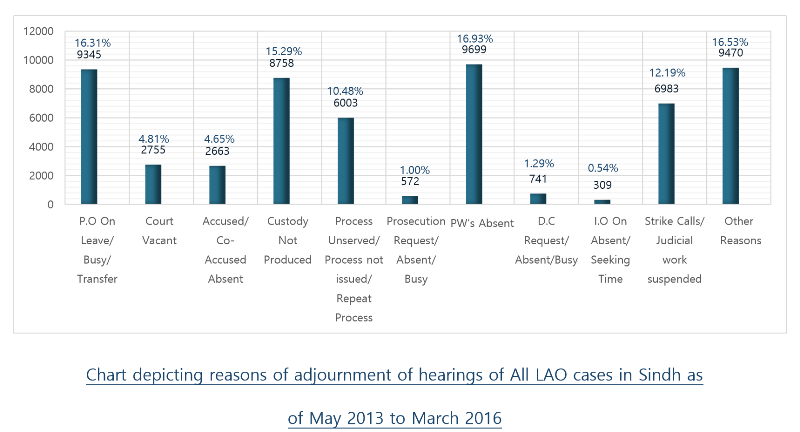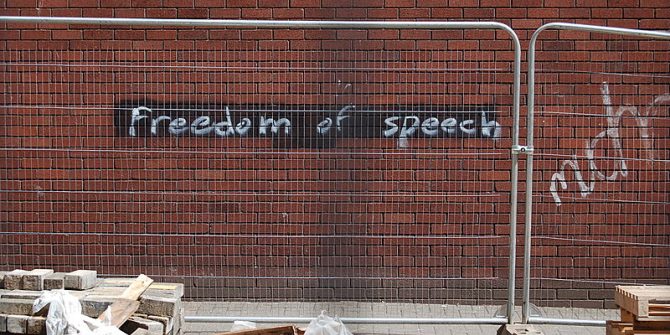 Pakistan’s legal system is notorious for its slow and inefficient handling of cases. In a new report, a group of lawyers drew on data from the Karachi trial courts to consider why criminal justice cases were so often adjourned. In this article, Angbeen Atif Mirza summarises the report’s findings and recommendations.
Pakistan’s legal system is notorious for its slow and inefficient handling of cases. In a new report, a group of lawyers drew on data from the Karachi trial courts to consider why criminal justice cases were so often adjourned. In this article, Angbeen Atif Mirza summarises the report’s findings and recommendations.
Pakistan’s legal system has, for good reason, garnered notoriety for its delays and inefficient management of case proceedings. According to a report published by the UNDP in 2012, 43% of the cases filed in the courts in Sindh took 5 to 10 years to be resolved. The situation takes on dire proportions when one considers criminal matters in particular, due primarily to the fact that individuals under trial are often made to languish in overpopulated jails for years before their case is heard and decided. The result is an overburdened judiciary, a sagging prison system and a lack of faith in the system of justice.
Delays in the criminal justice system
The first step towards any kind of informed policy development is to understand the problem. Therefore, in order to better appreciate the reasons for delays in the criminal justice system, lawyers of the Legal Aid Office who represent incarcerated men, women and children across the province of Sindh, began to note down the reason each time an adjournment was granted on a daily basis in the trial Courts at Karachi from May 2013 to March 2016. On average, these lawyers noted down data for 533 cases over this time period. They found that on any given day, there was a 58.65 per cent chance that their case would be adjourned. Coupled with the fact that courts in Pakistan do not hear cases on a day-to-day basis, this meant that a prisoner under trial would spend another few weeks in jail because his case was not heard on a given date.
The primary data was then made the subject of a research report in order to understand the various causes for adjournments. Upon a deeper study, it was noted that a majority of times cases were adjourned for very similar reasons. The paper aims to investigate the legal and institutional causes for these most common adjournments so as to inform policy which may help address these sources of delay.
Below is an overview of the major reasons adjournments were found to be granted:

For an accused person, the frequency and ease of adjournments means that many more months are spent in jail just because a witness didn’t show up, or the judge was on leave, or there was a shortage of prison vans to transport them to Court on their date of hearing. This state of affairs reflects major lapses in the criminal justice system and results in a needless burden on the prison administration.
Studies indicate that of the total population occupying jails in Pakistan, two-thirds of the inmates are under-trial prisoners. This means that these are individuals charged with a crime, though not yet proven guilty, who are sitting in jails waiting for their trial to conclude. There remains a chance that they will be found innocent and sent home free, only after having wasted years of their lives behind bars.
As indicated in the graph above, the most frequent cause for adjournments is non-appearance of witnesses to make a case against the accused. Judges are keen to wait for witnesses to show, but they appear to have no power to penalise non-appearance. The outcome is a delay. Judges are sometimes on leave; in such situations the matter is to be heard by an alternate judge. However, this process is fraught with confusion, and many times results in an adjournment by the alternate judge.
Sometimes, prisoners are not presented before the Court on their date of hearing. This could be due to a shortage of vans needed to transport them to the Court premises. An administrative failure such as this creates room for prison officials to exercise discretion over who will make their date of hearing and who will be left behind. This is patently illegal. Sometimes, accused parties fail to show up because they were never notified of a case being registered against them. This could be due to the fact that methods of notification are outdated – the law only provides for snail mail, or even a public messenger calling your name out on the streets with a drum, but does not provide for modern methods such as facsimile or electronic messaging, telephone calls or messages.
Strike calls by the lawyers’ bar associations results in many working days being lost, since the Courts cannot function without the striking lawyers. According to some reports, on average, every 4th working day is lost due to a strike.
Implications and recommendations
Overall, it is safe to conclude that the criminal justice system in Pakistan leaves much to be desired. Far from being a citizen’s resort to justice, it is currently seen as a tool in the hands of the powerful against the weak. State actors from all departments feed into the failure of the provision of justice. From an inept prosecution, to a reputedly corrupt police force, all elements of the criminal justice system are set to fail the citizen. The purpose of the research paper was to shed light on the various junctures at which a criminal trial lends itself to needless delays. Building upon the empirical data from Karachi, it highlights areas for further investigation and makes some recommendations to make the process more effective.
In addition to delays due to frequent adjournments, cases proceed on a slow pace due to the sheer number of cases that have to be decided by each judge. The first step towards a more effective justice system would be to make the post of a judge attractive to competent candidates, and increase the number of judges in the system. Similar steps need to be taken with the prosecution service. Other than being inept, the prosecution relies on the police for investigation results and evidence. The police force in Pakistan, and specifically in Karachi, which is the focus of this paper, is not equipped with modern methods of evidence collection. This hampers the case before it even begins. Training and upgrading the police services is an important step towards a more effective criminal justice system.
The granting of bail should be made an easier process, with realistic bond amounts set for release. While prisons remain overcrowded, they should be made more humane so as to assist the process of rehabilitation. No prisoner should ever have to miss their trial due to a shortage of prison vans, nor should a prisoner have to miss their trial due to a lawyers’ strike. Alternate methods of protest should be developed so that the right to protest is balanced with a prisoner’s right to have their trial proceed in a timely fashion.
Finally, frivolous litigation must be curtailed immediately by imposing heavy fines on the litigants and lawyers who attempt to misuse the system for their personal benefit. Taken together, these steps shall commence the process of change; change towards a more trustworthy and reliable system of justice.
This article summarises the findings of a new report by The Legal Aid Society. Read the full report here.
Cover image: The Scales of Justice. Credit: Clyde Robinson CC BY 2.0
This article gives the views of the author, and not the position of the South Asia @ LSE blog, nor of the London School of Economics. Please read our comments policy before posting.
About the Author
 Angbeen Atif Mirza is a practicing lawyer based in Lahore. She is a founding partner at Praxis Legal, Advocates and Consultants. In addition, she is interested in academic work and research and is a member of the Adjunct Faculty at the Shaikh Ahmad Hassan School of Law at Lahore University of Management Sciences. Her areas of interest include criminal justice, labour laws, environmental laws and women’s rights. She has been involved in human rights work in the form of public interest litigation as well as policy work.
Angbeen Atif Mirza is a practicing lawyer based in Lahore. She is a founding partner at Praxis Legal, Advocates and Consultants. In addition, she is interested in academic work and research and is a member of the Adjunct Faculty at the Shaikh Ahmad Hassan School of Law at Lahore University of Management Sciences. Her areas of interest include criminal justice, labour laws, environmental laws and women’s rights. She has been involved in human rights work in the form of public interest litigation as well as policy work.







